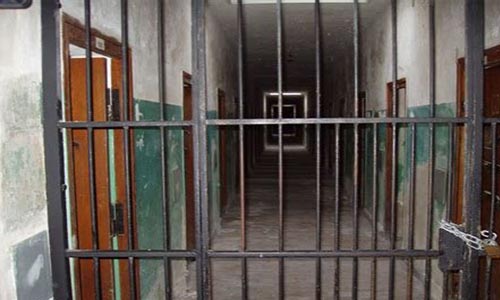Lawyers Demand Probe of Proposed N22.44bn to Feed Prisoners

On October 9, 2022, the Federal Government proposed over N22.44bn, for the feeding of inmates across the country.
It was gathered that the money was meant for the supply of catering materials and foodstuffs for the Nigeria Correctional Service in 2023.
Specifically, the Correctional Service is to spend N22,447,582,237 on the listed item.
The figure, which is part of the Federal Government’s executive proposal in the 2023 Appropriation Bill, also earmarked over N304.39bn for the parent ministry of interior.
Of the figure, the ministry of interior headquarters gets N2.66bn while the Nigeria Correctional Service gets N91.79bn.
The summary of Inmate Population by Convict and Awaiting Trial Persons as of October 17, 2022, is 76,203, with a total of male inmates 74, 574, a total of female inmates 1,629, a total of convicted inmates 23,131, convicted male inmates 22,742, and convicted female inmates 389.
While the number of awaiting trial inmates is 53,072, awaiting trial males, 51,832; awaiting trial females, 1,240. The percentage of convicted inmates is 30 per cent while awaiting trial inmates is 70 per cent. Of all, the percentage of the inmates, the male inmates is 98 per cent while the female is two per cent.
The Federal Government’s proposed N22.44bn for the feeding of inmates across the country for 2023 seems very unrealistic as the inmates will still not be fed well. Some inmates, who were in prison at the time their feeding allowance was increased from N450 per day to N750 and N1000, said that despite the increase of the feeding allowance from N750 to N1,000 per inmate, they still don’t feed well.
Some senior lawyers and former inmates spoke to Judiciary Watch on whether it is wise for the Federal Government to be spending so much when more than two-thirds of the inmates are awaiting trial.
A professor of Law, Prof Sam Erugo, SAN, said it is difficult to rationalize in terms of social justice.
He said that though it is the responsibility of the government to cater for prisoners, including awaiting detainees, it is an irony that a Federal Government that cannot afford social benefits of N1,000/day per indigent free citizen, including the elderly, sick and unemployed youth, can afford a budget of that amount for prisoners.
According to him, the challenge is not the budget but the corrupt system that would not let the budgeted sum be utilized for the purpose.
“It’s possible that even the budget is inflated or “padded.” Unfortunately, the issue of awaiting trial detainees has defied half-hearted and corrupt efforts to contain it.
“This is equally traceable to corrupt systems and institutions. It is unacceptable for Federal Government to be spending so much feeding mostly pre-trial detainees.
“I suggest that Federal Government should rather rethink strategies to reduce the number of pre-trial detainees to save scarce resources,’’ he said.
Erugo suggested that the Federal Government should be sincere in the strategies to achieve the reduction of the inmates, as a simple strategy could be to engage services of the Nigerian Bar Association and then ensure security agencies fully observe the tenets of the rule of law in handling criminal complaints.
“The era of detention at the slightest opportunity to exercise raw state power must be done away with. Security agents must be accountable for every wrongful detention,” he said.
On his part, Mr Victor Opara, SAN, said inmates needed to be fed whenever they are sent to the correctional centres but that the Federal Government needs to interrogate how the money is spent.
He said, “Once people are sent to correctional centres, either as convicts or remanded upon refusal of bail or remanded pending the perfection of bail, they needed to be fed. Just like only the living can praise God, only the living can stand trial.”
Opara stated that there is a need for the government to interrogate the humongous sum allegedly spent on feeding inmates.
“The inmates have human rights and needed to be catered for. The government must ensure the judicious use of monies allocated for feeding inmates.
“Our courts need to utilise alternatives to custodial sentencing in deserving cases to depopulate the correctional centres.
“Minor offenders should be fined, engaged in community service etc and not sentenced to correctional centres,” he said.
The chairman of the Nigerian Bar Association Section on Public Interest and Development Law, NBA-SPIDEL, Dr Monday Ubani, said that not even half of that budget will be used to feed the inmates in the correctional centres.
According to him, someone would rather be in a toilet where there is liberty than to be in a Nigerian prison, noting that it’s worse than the toilet environment.
“The Nigerian prison is dirty, smelling and the condition of those that are there is better imagined than being told. It’s hellish. If you stay there for one week and come out, you will be declared sick if you don’t go for tests and some medical treatment.
“That amount of money ordinarily would have taken good care of them appropriately if we have very decent people running Nigeria.
“As we see in prisons abroad where they eat three square meals per day, they have breakfast, lunch and dinner.
“I heard some Nigerians even prefer to go to prison abroad when they run into very difficult situations over there than return to Nigeria because the condition there is very palatable but not so with the Nigerian prison system or rehabilitation system. It’s the worst ever. So, that amount of money that has been budgeted will not get to the people it is meant for.
“The money is budgeted for them (the handlers). It is not meant for the prisoners; if the money is released, it will be shared among them,” Ubani said.



